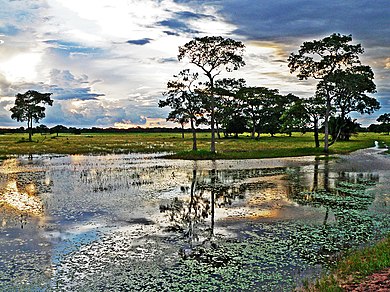Poconé
| Município de Poconé "Cidade Rosa"
Poconé
"Capital do Pantanal e das Tradições Culturais" |
|||
|---|---|---|---|
|
City entrance
|
|||
|
|
|||
| Coordinates | 16 ° 15 ′ S , 56 ° 37 ′ W | ||
 Location of the municipality in the state of Mato Grosso Location of the municipality in the state of Mato Grosso
|
|||
| Symbols | |||
|
|||
| founding | 1st July 1863 (age 157) | ||
| Basic data | |||
| Country | Brazil | ||
| State | Mato Grosso | ||
| ISO 3166-2 | BR-MT | ||
| height | 142 m | ||
| climate | tropical, Aw | ||
| surface | 17,025.4 km² | ||
| Residents | 31,779 (2010) | ||
| density | 1.9 Ew. / km² | ||
| estimate | 32,843 (July 1, 2019) | ||
| Parish code | IBGE : 5106505 | ||
| Post Code | 78175-000 | ||
| Telephone code | (+55) 65 | ||
| Time zone | UTC −4 | ||
| Website | www.pocone.mt.gov.br (Brazilian Portuguese) | ||
| politics | |||
| City Prefect | Atail Marques do Amaral (2017-2020) | ||
| Political party | PR | ||
| economy | |||
| GDP | 510,189 thousand R $ 15,842 R $ per person (2016) |
||
| HDI | 0.652 (medium) (2010) | ||
|
Pantanal wetland near Poconé
|
|||
Poconé , officially Município de Poconé , is a small town in the state of Mato Grosso in Brazil with an estimated 32,843 inhabitants as of July 1, 2019, called poconeanos . It is located at the entrance of the Pantanal and about 100 km from Cuiabá (capital of Mato Grosso). The name of the city comes from the Beripoconeses , Indians who lived in this area. This is where the Transpantaneira begins , the road connection from Poconé across the Pantanal to Porto Jofre on the Rio Cuiabá .
geography
The community area is around 17,025.4 km², which results in a population density of 1.8 inhabitants per km². The climate is tropical, Aw according to the Köppen and Geiger climate classification . The average temperature is 26.0 ° C. The average rainfall is 1239 mm per year. In the southern summer, Poconé has significantly more rainfall than in the southern winter.
Surrounding communities are Barão de Melgaço , Cáceres , Nossa Senhora do Livramento and Corumbá in Mato Grosso do Sul .
history
Founded on January 21, 1781, Poconé was the largest city in Brazil in terms of cattle auctions until a few decades ago. Up until about 25 years ago, most cows were auctioned here. Even today there is a cattle auction every Sunday. Until 15 years ago, Poconé was also the focus of many gold diggers who did not get through to the Pantanal, but tried again and again. The city flourished with the gold rush in the late 1980s. Bars, pubs and prostitution emerged , smuggling and drug trafficking developed. From the mid-1990s the prospectors disappeared again and life returned to normal. For many small shops, bar owners and restaurant owners that meant ruin. Not far from the city center there is still a huge gold mine several hundred meters deep, where gold is still being dug.
Economy
The people of Poconé love parties and celebrations. Some festivals last up to five days and traditional folk dances can be seen. The local cuisine is very different from the rest of Brazil. There is pacu (fish), rodízio (grilled meat), special freshwater fish from the Pantanal, piranhas with cassava and rice and fruit compotes made from local fruits. The fruit liqueurs produced here are regarded as a specialty and can also be purchased. The people live mainly from agriculture and forestry.
The gap between rich and poor can be clearly felt. The vast majority of the population live from hand to mouth. Many residents commute to Cuiabá because there is no work in Poconé. There is not enough money for larger investments . The tourism develops very slowly. The city is the starting point for a visit to the northern Pantanal and an attraction for bird , fishing and nature lovers who want to try their luck in the Rio Cuiabá , Rio Piraim and Rio Pixaim.
Sons and daughters
- José Afonso Ribeiro (1929–2009), Roman Catholic clergyman, prelate of Borba
- José Vieira de Lima (* 1931), Roman Catholic clergyman, former bishop of São Luíz de Cáceres
Web links
- City Prefecture website , Prefeitura Municipal (Brazilian Portuguese)
- City Council website , Câmara Municipal (Brazilian Portuguese)
- Brazilian Tourism Portal - Pantanal Norte. In: gov.br. 2006, archived from the original on May 27, 2006 ; accessed on January 19, 2018 (English). (older tourism site)
Individual evidence
- ↑ a b Climate Poconé: Weather, average temperature, weather forecast for Poconé. In: de.climate-data.org. Retrieved October 26, 2019 .
- ↑ a b c Poconé - Panorama. In: cidades.ibge.gov.br. IBGE , accessed October 26, 2019 (Brazilian Portuguese).
- ^ Tatá Amaral 22 (Prefeito). In: todapolitica.com. Eleições 2016, accessed October 26, 2019 (Brazilian Portuguese).





